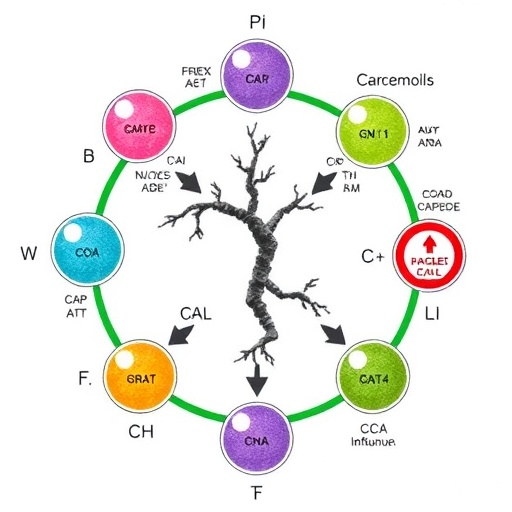With the emergence of research surrounding cancer metabolism, the role of oncometabolites derived from the tricarboxylic acid (TCA) cycle has garnered considerable interest. As detailed in a recent study led by Sarkar et al., these metabolites play a crucial role in altering both tumor behavior and the surrounding immune microenvironment. The researchers reveal how the disruption of normal metabolic pathways leads to the accumulation of these harmful byproducts, which not only fuel tumor growth but also manipulate immune responses within the tumor niche.
The TCA cycle is a central metabolic pathway that plays a pivotal role in cellular respiration and energy production. However, cancer cells often exhibit altered metabolism, referred to as the Warburg effect, where they rely more on glycolysis for energy production, even in the presence of oxygen. This metabolic shift results in the production of various oncometabolites that can have significant implications for tumor growth and metastasis.
One of the primary oncometabolites discussed in the research is 2-hydroxyglutarate (2-HG), which has gained recognition for its role in driving tumorigenesis in specific types of malignancies, particularly gliomas and acute myeloid leukemia. The study elucidates how the accumulation of 2-HG occurs via mutations in isocitrate dehydrogenase (IDH) enzymes, which leads to profound epigenetic changes and altered transcriptional programs in tumor cells.
Additionally, fumarate and succinate are other notable oncometabolites derived from TCA cycle dysregulation. The research emphasizes how succinate accumulation, primarily associated with hereditary cancer syndromes such as fumarate hydratase deficiency, can reactivate hypoxia-inducible factor (HIF) pathways. This reactivation results in increased angiogenesis and a pro-tumorigenic environment, creating a perfect storm for tumor progression.
As the immune landscape is intricately linked to tumor metabolism, the study makes a compelling case for examining how these oncometabolites influence immune cell function. Whereas traditional views have largely separated cancer biology and immunology, current findings illustrate a much more complex interaction. For instance, elevated levels of certain metabolites can inhibit T cell activation, thus providing tumors with a means of evading immune surveillance.
The implications of altered TCA cycle metabolism extend beyond mere tumor growth. The research showcases how the interplay between oncometabolites and immune cells can dictate therapeutic outcomes. Understanding the metabolic cross-talk in the tumor microenvironment presents new avenues for immunotherapy. The study argues that if we can manipulate these metabolic pathways, it may be possible to enhance the efficacy of existing treatments or even develop novel strategies targeting metabolic vulnerabilities in tumors.
The authors further discuss the emerging therapeutic potential of targeting these oncometabolites in cancer treatment. Inhibitors that specifically target metabolic pathways associated with oncometabolite production are currently in preclinical and clinical development. For instance, IDH inhibitors have shown promise in treating patients with IDH-mutant cancers, effectively reducing 2-HG levels and thereby reverting some of the malignant features induced by the metabolite.
Moreover, the study emphasizes the importance of combining metabolic therapies with immunotherapies, suggesting that a dual-targeted approach may yield synergistic effects. Recent clinical trials have begun to explore this combination, as fostering a more favorable immune environment while simultaneously crippling the tumor’s energetic capabilities could lead to enhanced therapeutic responses.
In addition to pointing toward novel treatment strategies, the insights gleaned from the study encourage a broader reevaluation of cancer metabolism as a critical factor influencing tumor biology. Researchers are now urged to integrate metabolic profiling into routine clinical practice, as it may not only serve as a prognostic biomarker but also inform treatment decisions based on the distinct metabolic vulnerabilities of individual tumors.
As cancer biology continues to evolve, the understanding of TCA cycle-derived oncometabolites will undoubtedly shape future research directions. The intricate relationship between metabolism and immune response underscores a fundamental shift in how cancer is perceived and treated. It’s a clarion call for researchers and clinicians alike to forge new paths that bridge these two critical fields.
The study by Sarkar and colleagues represents a significant contribution to our understanding of cancer metabolism and the immune microenvironment. As awareness grows, the acknowledgment of these metabolic mechanisms may catalyze the development of innovative therapeutic strategies aimed at dismantling the metabolic foundations of cancer. In the coming years, the promise of exploiting oncometabolites for therapeutic gain will likely become more apparent, ushering in a new era of precision oncology.
The exploration of TCA cycle-derived oncometabolites epitomizes the intertwined nature of cancer progression and the immune response, urging a shift in focus towards a combined metabolic and immunological approach in tackling cancer. As the scientific community continues to unravel the complexities of tumor metabolism, it is clear that the road ahead holds great potential for discovering effective and targeted interventions that could transform cancer care for patients around the globe.
Subject of Research: TCA cycle-derived oncometabolites in cancer and the immune microenvironment
Article Title: TCA cycle-derived oncometabolites in cancer and the immune microenvironment
Article References:
Sarkar, S., Chang, CI., Jean, J. et al. TCA cycle-derived oncometabolites in cancer and the immune microenvironment.
J Biomed Sci 32, 87 (2025). https://doi.org/10.1186/s12929-025-01186-y
Image Credits: AI Generated
DOI: 10.1186/s12929-025-01186-y
Keywords: TCA cycle, oncometabolites, cancer metabolism, immune microenvironment, 2-hydroxyglutarate, fumarate, succinate, immunotherapy, metabolic therapy.




